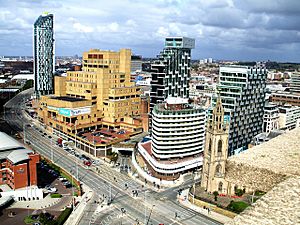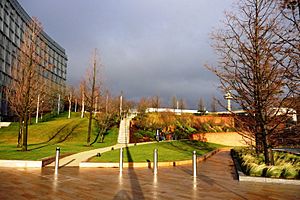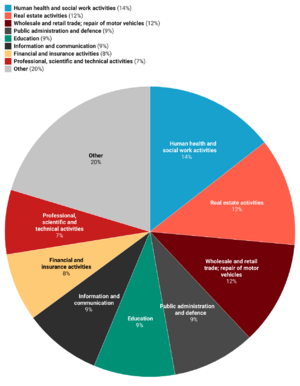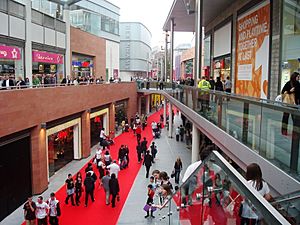Economy of Liverpool facts for kids

Liverpool's commercial district
|
|
| Statistics | |
|---|---|
| Population | 498,042 (2005 est.) |
| GDP | £18.6 billion (2022) |
|
GDP per capita
|
£37,449 (2022) |
|
Labour force
|
232,100 / 67.5% in employment (Jan–Dec 2023) |
|
Labour force by occupation
|
List
25.3% Professional
20.7% Associate professional 11.2% Administrative and secretarial 9.8% Caring, leisure and other service 9.3% Managers, directors and senior officials 7.7% Skilled trades 6.2% Sales and customer service 5.0% Process plant and machine operatives 3.9% Elementary occupations (Jan–Dec 2023) |
| Unemployment | 17,400 / 7.0% (Jan–Dec 2023) |
|
Average gross salary
|
£646.40 per week (2023) |
| External | |
| Exports | £3.2 billion (2021) |
|
Export goods
|
£1.2 billion (2021) |
| Imports | £3.2 billion (2021) |
|
Import goods
|
£2.2 billion (2021) |
The economy of Liverpool is all about how people in and around Liverpool, England, make and spend money. It covers all the jobs, businesses, and industries that keep the city going.
Liverpool is a big city in the United Kingdom. Over 1.3 million people live in its wider area. It's a key part of the Merseyside region's economy in the North west of England.
In 2017, the Liverpool City Region grew faster than any other area in the UK. This showed how strong its economy was becoming.
Contents
How Liverpool Makes Money
In 2021, the total value of goods and services produced in Liverpool was £14.29 billion. This is called its gross value added (GVA). The city's gross domestic product (GDP) was £15.91 billion. These numbers show how much money the city's economy generates.
Service Jobs in Liverpool
Like many places in the UK, Liverpool's economy mostly relies on service industries. These are jobs that provide services rather than making physical products. In 2007, over 60% of jobs were in areas like public administration, education, health, banking, and insurance.
Government Jobs
Liverpool is an important place for government work. Many government departments have offices here. Local government agencies like Liverpool City Council also have a big presence. For example, offices for HM Passport Office and Her Majesty's Revenue and Customs are in the city.
Money and Insurance Jobs
The banking, finance, and insurance industries are growing fast in Liverpool. Between 2006 and 2007, jobs in these areas increased by 5.3%. Big companies like Barclays, JPMorgan, and the Royal Bank of Scotland Group have invested in Liverpool. Many large call centres and professional advice firms have also opened here.
Tourism in Liverpool

Tourism is a huge part of Liverpool's economy. In 2018, about 38 million visitors came to the city. This was a 7.4% increase from the year before. The number of people staying overnight also went up by 5% to 2.7 million. In 2017, visitors from other countries brought in £358 million to the local economy.
More tourists mean more hotels, restaurants, and clubs. In 2008, Liverpool city centre had 37 hotels with 3,481 rooms. By 2017, this number grew to 67 hotels with 6,600 rooms. More hotels are planned, which will add even more rooms.
Liverpool is special because cruise ships can dock right in the city centre. Since 2008, many large ships have visited Liverpool Cruise Terminal. These include famous ships like the Grand Princess and the Queen Elizabeth 2. From 2013, Liverpool started offering "turnaround" operations. This means passengers can start and end their cruises from Liverpool.
In 2017, Liverpool City Council announced plans for a new £50 million cruise terminal. It will be built near the current one at Princes Dock. The new terminal will handle ships with up to 3,600 passengers. It will also have dedicated passport control and a cafe. Construction was expected to finish in 2020.
Liverpool and its nearby areas also have many sandy beaches. You can easily reach them by Merseyrail train. These beaches are very popular in the summer.
Film and TV Industry
Liverpool has always been a popular place for TV shows and movies. The city's unique buildings and different landscapes make it a great filming location. It can even look like other cities, such as New York or London. This makes Liverpool the second most filmed city in the UK.
The Liverpool Film Office helps promote the city for new film projects. They connect filmmakers with local partners. This helps bring filming and investment to the city. In 2019, filming brought an estimated £17.6 million into Liverpool's economy. There were 324 productions, totaling 1,750 days of filming.
In 2018, Twickenham Studios announced plans to open a large space in the Littlewoods Pools building. They will also use two new sound stages built next to the main building.
Shopping in Liverpool
Liverpool's main shopping area has many streets and shopping centres. Some of the biggest shopping streets are Church Street, Lord Street, Bold Street, and Mathew Street.
Liverpool One is a huge shopping complex that opened in 2008. It covers a large part of the city centre. Part of it is built on the old Chavasse Park, but much of the park is still there.
Before Liverpool One opened, St. John's Shopping Centre was the biggest. It is still the largest covered shopping centre in the city.
Other shopping centres include Clayton Square Shopping Centre and Metquarter. Metquarter opened in 2006 and has many fancy boutique stores. Outside the city centre, there are also New Strand Shopping Centre in Bootle and New Mersey Shopping Park in Speke.
Knowledge and Tech Jobs
Liverpool has seen growth in new media, especially in computer game development. Sony, a big electronics company, has one of its European PlayStation research and development centres in the city. They bought a company called Psygnosis to do this. Early PlayStation software developer kits were largely programmed by Sony's Liverpool studio.
The Baltic Triangle area of the city used to be for old industries. Now, it's a hub for creative and digital businesses. Companies like game developer MilkyTea and entertainment website Karibu are based there.
Manufacturing in Liverpool
Cars are also made in Liverpool at the Halewood plant. This plant used to assemble the Jaguar X-Type and Land Rover Freelander models. The X-Type stopped production in 2010. However, the new Range Rover Evoque started being made there in 2011.
Port of Liverpool
The Port of Liverpool is a very important part of the city's economy. Peel Holdings, which owns the port, announced big plans in 2007. They want to redevelop the northern dock area with a project called Liverpool Waters. This project could create 17,000 jobs and bring £5.5 billion in investment over 50 years. There's also a similar project called Wirral Waters on the other side of the River Mersey.
In recent years, the Port of Liverpool has become busy again. Japanese company NYK and Danish company Maersk Line have both moved their UK headquarters to the city.
The port was made even bigger with the building of Liverpool2. This is a special container terminal for very large ships. It can handle ships carrying 13,500 containers. Before, the limit was 3,500 containers.
Images for kids
 | Sharif Bey |
 | Hale Woodruff |
 | Richmond Barthé |
 | Purvis Young |





